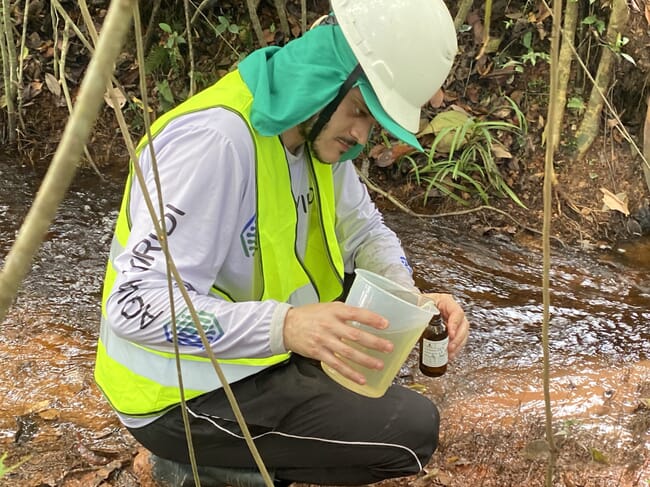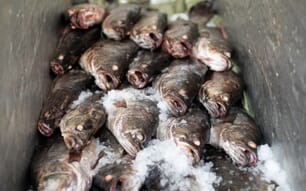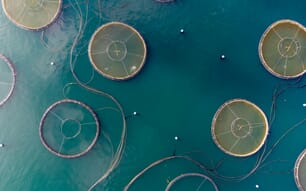
“I’ve been working with microalgae for more than 20 years,” Almeida says. “I started in genetics, but when I discovered microalgae it was like discovering a new world. I decided to dedicate my career to them.”
Born in Minas Gerais, near Sao Paulo, and trained as a biologist, Almeida moved to the Amazon to pursue her master’s degree – a dream she’d harboured since childhood. She initially worked in education and research for over a decade, travelling to every one of the 62 municipalities in the state of Amazonas. But the idea for Aqua Viridi came during a swim in the Rio Negro – one of the Amazon’s main tributaries – with three research colleagues who would later become her co-founders.
“We were talking about the forest fires here, about how farmland expansion and soy production were impacting the Amazon,” she recalls. “We asked ourselves: how can we use our knowledge to help? How can we give back to the forest that has given us so much?”
Their answer was to build a company using Amazonian microalgae to reduce dependence on soy and synthetic agrochemicals, while also cleaning polluted water and creating high-value products. In 2022, Aqua Viridi was formally launched.
A three-pronged approach
The startup’s work is divided into three main areas: products, services and applied research. On the products side, the company’s most advanced offering is currently a microalgal powder made from Scenedesmus and Chlorella sp. for animal feed that has shown impressive results in trials with tambaqui (Colossoma macropomum), a fish much prized in the region.
“With just 3 percent inclusion of our microalgae powder in the feed, the fish gained 10 percent more length and 30 percent more weight – and we reduced antibiotics use by 25 percent,” Almeida says.
While algae-based feed supplements are by no means unusual in aquaculture, Almeida is quick to highlight the company’s unique strengths, notably: the development of proprietary strains of Amazonian microalgae; its high nutritional content – including omega-3, 6, and 9, vitamin E, beta-carotene, and astaxanthin; and deep, place-based knowledge of how to cultivate algae in one of the planet’s most challenging environments.
“Together, our founders have more than 50 years’ experience in the Amazon,” she says. “We truly understand this place and its organisms. And we’ve developed systems to make them grow here.”
The powder is now being tested in petfood, and the company is also preparing to enter the human nutrition market with a range of spirulina-based products.
The other algal product lines being developed by the startup include biofertilisers and biostimulants, which have been tested on local crops such as guarana, açaí and even soy.
“We can increase [crop] productivity and growth speed by up to 30 percent,” Almeida explains.
Meanwhile, the company’s services arm focuses on water quality and aquatic life monitoring, algal bloom management and bioremediation. In one high-profile project, Aqua Viridi is working with Manaus’s authorities to restore a lake in the city that is currently plagued by cyanobacteria.
“We have three steps,” Almeida says. “First, we diagnose the problem. Second, we remove the harmful cyanobacteria and assess the biomass for safe reuse as fertiliser. Third, we install photobioreactors to treat aquaculture effluents before they reach the lake, and we inoculate our native Amazonian algae to prevent new blooms. Because they’re local strains, they’re not invasive.”
Scaling up
From its base inside a research institute in Manaus, Aqua Viridi currently produces 2,000 litres of algae a week in 12 photobioreactors. However, according to Almeida, a major leap is on the cards.
“We’re about to build the first biorefinery in the Amazon. With it, we’ll scale from 2,000 litres a week to 100,000 litres. That means going from about one kilo of dry matter a week to 10–20 kilos, depending on conditions,” she explains.
The new facility will use both photobioreactors and raceway ponds, increasing output while maintaining the delicate control needed to cultivate algae in the Amazon’s extreme climate – where humidity is high and temperatures can hit 46°C.
“Several studies show that open ponds in the Amazon region can be even more productive than photobioreactors, which indicates that the yield in dry biomass may exceed current estimates,” Almeida observes.

Building a team
One of Almeida’s proudest achievements so far has been assembling a capable team in a region where advanced biotech skills are scarce.
“We have four founders – three biologists and a digital marketing specialist – plus up to 14 freelancers, depending on demand,” she says. “We train people ourselves because there aren’t many PhDs here. It’s about developing human resources for the Amazon.”
She also credits grants – they’ve received around US $400,000 to date, with a further $100,000 approved – for helping them build infrastructure. But she’s also now seeking $300,000 in investment to fund the recruitment and employment of operational and sales staff.
“Our main challenge is creating a strong go-to-market plan,” Almeida admits. “In Brazil, soy is a very consolidated commodity. We have to show the agro-industry the value of our products, and that takes the right team, the right connections and the right knowledge.”

An international outlook
While rooted in Amazonian biodiversity, Aqua Viridi sees potential markets not just across South America – where Chile, with its huge salmon industry, is high on the list – but also in regions such as MENA.
“From our perspective here in Brazil, MENA has been increasingly relevant in trade discussions, partly due to the strengthening of ties with the BRICS bloc. These markets traditionally rely on commodities, but also show strong openness to innovative solutions that add value and differentiate from standard supply chains. For MENA, the products we have in mind are those we are preparing to scale commercially: biofertilisers and biostimulants derived from microalgae,” Almeida explains.
Almeida’s participation in the Women in Ocean Food programme earlier this year helped cement that vision. “It opened my mind to the importance of building international connections,” she says. “It showed us that we can, and we deserve to, be part of those networks.”
But she is equally committed to ensuring that Aqua Viridi’s work benefits the locals.
“We want to be more than a company,” she says. “We want to build a centre for research and development here. Without strong human resources, biotech can’t grow in the region.”
Aqua Viridi’s roadmap is ambitious. By 2026, the company aims to have its biorefinery fully operational and its microalgal powder, biofertilisers and biostimulants on the market. By 2027, spirulina-based human food products will join the portfolio, followed by high-value compounds like astaxanthin and beta-carotene, and then an entry into cosmetics in 2028.
Given the scope, scale and potential impact of the business Almeida sees plenty of space for others to join.
“It’s important to have other microalgae companies in Brazil,” she reflects. “They help build the ecosystem, open markets and show what’s possible.”








